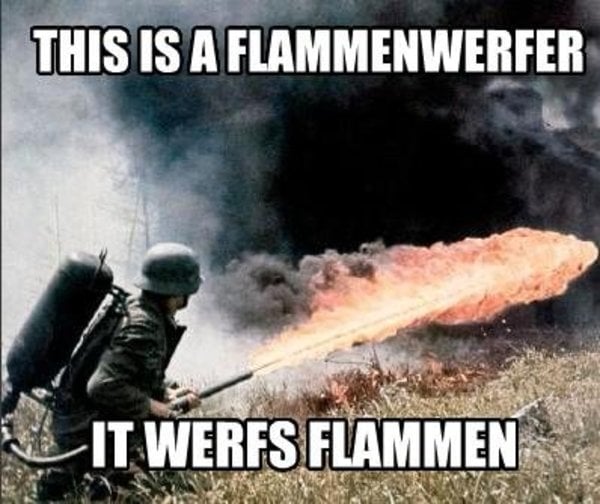Uvula? The german says Gaumenzäpfchen. It’s a Zäpfchen and it’s dangling from the Gaumen. Makes sense, no?
Reminds me of the Flammenwerfer!

It’s literally a 1:1 translation of Flamethrower.
There are much better examples for long German words beeing short in English like
Toy = Spielzeug (Play Stuff)
Mall = Einkaufszentrum (Shopping Centre)
Sale = Schlussverkauf (End sale)
Matchbox = Streichholzschachtel (Swipe wood box)
Lighter = Feuerzeug (Fire Creator)
I don’t think that was intended as an example of a long German word being short in English. Rather, it was an example of the meaning of a word being clear from the word itself.
To me it was both. The descriptive nature of words on the one hand and the word length which often comes with it on the other.
Eichhörnchenschwanz is one more nice example (it also works with dialects: oachkatzlschwoaf - an oak cat’s tail) :D
🇳🇱 Eekhoorntjesstaart! (And vlammenwerper of course.)
Google insists that I must have mistyped eekhoorntjestaart. Who am I to argue? 🤷♀️

Didn’t know I’d be thinking about a “palate suppository” when I woke up today, but here it is.
The word Zäpfchen itself is the diminutive of Zapfen, a stud, peg or pin. E.g. the fruits of needle trees are also called Zapfen, Tannen-, Fichten- or Kiefernzapfen. So Gaumenzäpfchen is a small stud dangling down from the palate.
This makes way more sense! (and also makes it obvious I currently do not speak German 😅)
So it’s a girl house.
Why the random K’s?
It’s the tongue speaking.
That was my first guess, but when I sounded out the words as spelled it didn’t sound very… tongue-y. Maybe I’m not hearing it right.
Edit: you don’t even use your tongue to make the K sound 🤔
You do use it. You need to press your tongue to the roof of your mouth to make a k sound.
This happens close to the back of your mouth where the molars are…
Huh, fair enough.
I still don’t associate the tongue with a K sound 😅 a lisp I feel would make more sense
you don’t even use your tongue to make the K sound
I almost think I do!
…And the comic is more about the character being lispy.Someone else pointed out the use of the tongue for the K sound.
I used to have a lisp that I took speech therapy for, it definitely didn’t sound like I was putting K in everything, but maybe the artist hears it differently than I do
UwU - La?
IT SOUNDS LIKE A SEX THING
It isn’t?!?
Anything can be a sex thing (once) if you’re brave enough
I was talking to my hairdresser once and accidentally called my tonsils testicles so maybe uvula can be vulva now to make it all even
I think of this scene from Monster House every single time I hear the word uvula https://youtu.be/oM0SArkFxco
So it’s a girl house
So it’s a girl house
Delores?
Mulva?
Monster house reference I think.
I also am pavlov’d to remember this line every time, great minds think alike. Or the superior German proverb, two fools one thought
Great minds think alike is only half the proverb. The other one is: , but fools rarely differ. Somewhat similar to the german one.
Wasn’t Uvula that comms officer on Star Trek?
That’s called a “clacker” where I come from.
[Edit] That might be a really local dialect term that nobody else understands.
It might be a family thing, or even dialectal from where I grew up, but its common name for me is “(the) clack”.
Wiktionary suggests that the name “clack” is used for the tongue, but then there’s this Black country (UK West Midlands, where I’m not from) dialect page: https://www.sedgleymanor.com/dictionaries/dialect.html that actually lists “clack” as being a name for the uvula, so it might well dialectal word used the north of England and the midlands.
Delightful and relatable
Must’ve been confusing to the Romans
My name is Uvuvwevwevwe Onyetenyevwe Ugwemuhwem Osas













